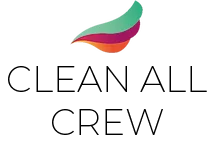While moving home can feel like the beginning of an exciting new adventure, the administrative aspect of tying up loose ends in your old rental property can cause stress and consternation – particularly when it comes to cleaning.
Most tenancy agreements will stipulate how the landlord expects the property to be left after you vacate it. If you haven’t got a copy of your existing tenancy agreement to hand, now might be a good time to request one. This way, you’ll have a clear set of guidelines on how you should leave the property.
Why is end of tenancy cleaning important?
In the rental sector, tenants pay an upfront deposit to cover any potential damages to the property during their stay. This deposit is held until the tenant vacates the property. At the end of the tenancy, the tenant receives their deposit back, on the provision that the property has been left in good condition, as described in the tenancy agreement.
Most tenancy agreements will contain an inspection checklist and inventory of items from when you first moved in. When you perform a deep clean prior to moving out, your end goal is to ensure each of these checklist items are cleaned and fully functional.
While this all may seem straightforward, it’s worth noting that some landlords are notoriously pernickety about what constitutes “good condition”. UK tenants have been known to lose deposits, or partial deposits, over seemingly innocuous minor scuffs or marks on walls, mould in bathrooms or even dust in the corner of the living room!
To ensure you receive your full deposit back after vacating a property, it is crucial that you prepare your home and ensure it is fully deep cleaned prior to any final landlord inspection. This guide is designed to help you to get your deposit back in full.
Domestic cleaning: DIY or hire the professionals?
Before moving, you’ll have two choices when it comes to that big final clean: do it yourself or hire a team of professional end of tenancy cleaners. If you choose to do it yourself, be prepared for a time consuming, arduous, frustrating and tiring task! However, one of the plus sides of performing your own end of tenancy clean is that you’ll have complete peace of mind that each room has been cleaned to your own personal standards, and you’ll have full control over the operation.
Despite this, it’s worth noting that end of tenancy cleaners can actually be more cost-effective. Instead of taking time off work to tidy your property, you can instead rely on a team of professional domestic cleaning experts with experience and understanding of what landlords expect from a vacated property.
How to tackle an end of tenancy clean by yourself
If you’ve decided to clean your property prior to moving, these tips and tricks should help you to secure your deposit in full. Remember to give yourself plenty of time to get the job done, and if the task feels too overwhelming, don’t be afraid to concede and call in a professional domestic cleaning team to help.
The importance of oven cleaning
Most of us are guilty of allowing our ovens to accumulate a bit of dirt. However, it is paramount that your oven is sparkling clean prior to moving out. This is because the oven is usually the first appliance checked during the inspection of a recently vacated property.
Cleaning methods can vary depending on the type of oven, how dirty the oven is, and where the dirt has accrued. If a simple oven cleaner won’t shift stubborn interior stains, it might be time to call in your local end of tenancy cleaners.
Kitchen cleaning checklist
Remove all items from cupboards and shelves.
Wipe down cupboard interiors and shelves with a damp cloth, removing any crumbs/debris in the process.
Pull any appliances away from walls/cubby holes and wipe beneath/behind them.
If your property is rented as furnished, clean any appliances (such as washing machines and dishwashers) thoroughly, ensuring any built-up grime is removed.
Thoroughly clean the fridge, ensuring all trays racks and shelves are removed and soaked in warm, soapy water. Dry them thoroughly and replace.
When leaving the property, turn all appliances off at the mains, and leave appliance doors open to prevent any mould build-ups.
Bathroom cleaning checklist
Wipe down ALL surfaces, ensuring any stains are removed. This includes the sink, toilet, bath, mirror, tiles and floor.
Check plug holes/drains for blockages, and use a drain cleaner if required.
Check metallic surfaces (shower heads/taps/drains) for limescale and/or mould. Remove limescale and mould with a kitchen cleaner if required. If you do not have a purpose-built cleaner to hand, a solution comprised of white vinegar and fresh lemon is just as effective.
Living room cleaning checklist
In the living room, floors take priority, followed by general dusting. If your floor is carpeted, ensure it is vacuumed thoroughly, and use a stain remover to shift any stubborn stains. If you are struggling to remove stains, you might want to consider hiring a professional domestic cleaner with access to an industrial carpet cleaner/steamer.
If you have wooden or laminate flooring, ensure it has been sufficiently mopped, and be certain to use a cleaner which will not damage the floor surface. Again, if you are unsure, it might be worthwhile calling a professional.
Once your floors are clean, it’s time to clear all shelves, cabinets, tables, cupboards and television/entertainment stands, and give them a thorough dusting/polishing.
Other considerations
Windows:
Clean all windows inside and out, if it is safe to do so. If you cannot reach exterior windows, you should seek the services of a professional domestic window cleaner.
Walls:
Scuff marks on walls and skirting boards are usually easy to wash off. If the stains won’t wash, consider painting over them if you have access to the same colour paint. If the wall is peppered with several stains, it might be worthwhile painting the entire wall. If you don’t, your landlord will likely arrange for a contractor to perform this task, and either invoice you for the expense incurred or deduct the amount from your deposit.
Furniture:
Vacuum all textile furniture, such as sofas and chairs. If needs be, wash them with a dry wash solution. Furniture should be left free from hair, odours or stains.
Curtains/blinds:
Curtains can be tricky. Some are machine washable, whereas others require dry cleaning. Be sure to read any labels before attempting to clean them. If your property has blinds, ensure the slats aren’t damaged and replace them if necessary.
Gardens:
If your tenancy requires you to keep good care of the garden, be certain to give it a once-over before you move. Sweep up leaves, mow the lawns and prune hedges if required.
Conclusion
By following these simple tips at the end of your tenancy, you will be in a much better position to get your deposit back. If you require further advice on how to prepare your house before moving, or to get a free, no-obligation quotation for our professional end of tenancy cleaning services in London, please do not hesitate to contact Clean All Crew Ltd today.







